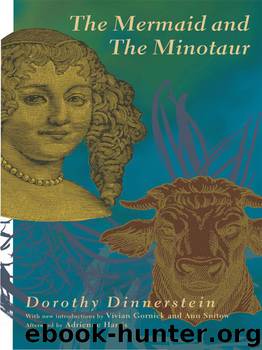Mermaid and the Minotaur by Dorothy Dinnerstein

Author:Dorothy Dinnerstein [Dinnerstein, Dorothy]
Language: eng
Format: epub
Tags: Psychology, Movements, Psychoanalysis
ISBN: 9781590514696
Google: q4mbEaVX8w4C
Amazon: 1892746255
Publisher: Other Press
Published: 1999-06-17T04:00:00+00:00
* * *
Box H
Brown follows Freud in insisting that “infantile sexuality is the pursuit of pleasure obtained through the activity of any and all organs of the body,” and that it constitutes “the ultimate essence of our desires and our being,” which is “nothing more or less than delight in the active life of all the human body.” But what he says next makes it clear that he does not really mean delight in all the active life of the body, or pleasure in the exercise of all its organs. Reason, he tells us, is rejected in the unconscious because man is “secretly faithful to the principle of pleasure, or, as Blake calls it, delight.” The Homo sapiens higher central nervous system, then, that most human of organs, does not count in his view as an organ.
Again: “The ultimate essence of our being is erotic and demands activity according to the pleasure principle”; but this does not include, apparently, the reasoning, self-reflective, inventive activity of the brain. His explanation of why “man never unfolds the mode of being which is proper to his species and given in his body” rejects precisely that feature of what is given in our bodies that makes the unfolding of a mode of being proper to our species a problem for us and not for our animal relatives: It leaves out the considerations that are forced on thinkers about this problem by what is now being discovered about the transition from ape to human (see Chapter 2), considerations that were anticipated by Darwin and discussed tentatively even by Gordon Childe (Man Makes Himself), whom Brown quotes in other connections. His account of what “generates the compulsion to change the internal nature of man and the external world in which he lives”—in other words, what made the Homo sapiens physique evolve—omits planfulness, adventurousness, imagination. The sole motivating force to which he points is “repression,” which in “giving man a history” subordinates “the life of the individual to the historical quest of the species.” By “the” life of the individual he seems to mean the part of that life which is unconcerned with transcending itself, untouched by what I described above as education: the vital part that, as he puts it, “in infancy … tasted the fruit of the tree of life, and knows that it is good, and never forgets.” But of course there are other vital parts: if there were not, the temporally extended consciousness implicit in “never forgets” could not exist. “Human sociability,” he sums up—that is, the pooling of intelligent effort that shaped our bodies—“is a sickness.”
The conjecture that sickness—psychopathology—has most likely been an essential factor in the evolution of our capacity for intelligent effort (and of the other physical traits that go with this capacity) seems to me, unhappily, all too well founded. Brown has vastly deepened my—our—appreciation of this likelihood, which is fundamental for an effort to come to terms with our situation: having said this, one has said the main thing about his book that needs saying.
Download
This site does not store any files on its server. We only index and link to content provided by other sites. Please contact the content providers to delete copyright contents if any and email us, we'll remove relevant links or contents immediately.
The Art of Thinking Clearly by Rolf Dobelli(10489)
The 5 Love Languages: The Secret to Love That Lasts by Gary Chapman(9815)
Mindhunter: Inside the FBI's Elite Serial Crime Unit by John E. Douglas & Mark Olshaker(9343)
Becoming Supernatural by Dr. Joe Dispenza(8217)
Nudge - Improving Decisions about Health, Wealth, and Happiness by Thaler Sunstein(7706)
The Road Less Traveled by M. Scott Peck(7603)
Mastermind: How to Think Like Sherlock Holmes by Maria Konnikova(7347)
Enlightenment Now: The Case for Reason, Science, Humanism, and Progress by Steven Pinker(7313)
Win Bigly by Scott Adams(7198)
The Way of Zen by Alan W. Watts(6614)
Factfulness: Ten Reasons We're Wrong About the World – and Why Things Are Better Than You Think by Hans Rosling(4742)
The State of Affairs by Esther Perel(4720)
Gerald's Game by Stephen King(4654)
Man's Search for Meaning by Viktor Frankl(4606)
The Confidence Code by Katty Kay(4260)
Thinking in Bets by Annie Duke(4227)
The Healing Self by Deepak Chopra(3578)
Hidden Persuasion: 33 psychological influence techniques in advertising by Marc Andrews & Matthijs van Leeuwen & Rick van Baaren(3565)
The Worm at the Core by Sheldon Solomon(3487)
